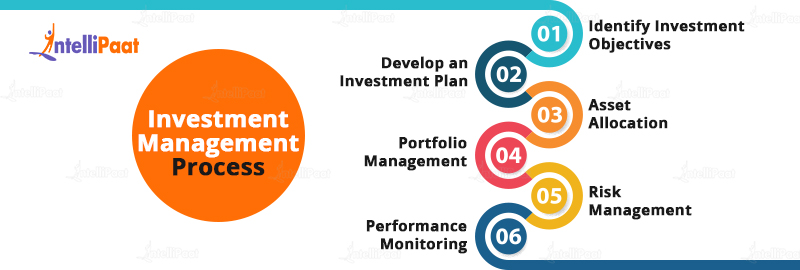What is Investment Management?
Table of Contents-
- What is meant by Investment Management?
- What are the 4 types of Investments?
- What is Investment Management Software?
- Features of Investment Management Software
- Investment Management Objective and Functions
- Importance of Investment Management
- Investment Management Process
- Investment Management Examples
- What Investment Managers do?
- Investment Banking vs Wealth Management
- Scope of Investment Management
- Conclusion
Learn the basics of Investment Banking by watching the video below:
{
“@context”: “https://schema.org”,
“@type”: “VideoObject”,
“name”: “Investment Banking Course & Training | Investment Banking Certification | Intellipaat”,
“description”: “What is Investment Management?”,
“thumbnailUrl”: “https://img.youtube.com/vi/S4hRXmuuk3w/hqdefault.jpg”,
“uploadDate”: “2023-04-19T08:00:00+08:00”,
“publisher”: {
“@type”: “Organization”,
“name”: “Intellipaat Software Solutions Pvt Ltd”,
“logo”: {
“@type”: “ImageObject”,
“url”: “https://intellipaat.com/blog/wp-content/themes/intellipaat-blog-new/images/logo.png”,
“width”: 124,
“height”: 43
}
},
“contentUrl”: “https://www.youtube.com/watch?v=S4hRXmuuk3w”,
“embedUrl”: “https://www.youtube.com/embed/S4hRXmuuk3w”
}
What is meant by Investment Management?
Investment management is a crucial aspect of the financial industry that aims to maximize the returns on investment while minimizing risks. Investment management plays a significant role in achieving financial goals and is a complex and competitive industry.
It is a process of managing assets and funds for individuals, corporations, and institutions. The main goal of investment management is to maximize profits while minimizing risks.
It involves making investment decisions on behalf of clients, selecting appropriate investment options, and diversifying the portfolio to reduce risks.
Investment management involves managing various financial assets, such as stocks, bonds, mutual funds, and real estate.
It involves managing assets and funds for individuals, corporations, and institutions.
What are the 4 types of Investments?

Investments are financial assets that people or businesses acquire with the goal of generating income or increasing their wealth over time. There are four main types of investments, each with their own set of advantages and disadvantages. They are:
- Stocks:
Stocks represent ownership in a company and are traded on stock exchanges. Investors can purchase shares of a company and potentially earn dividends and capital gains as the company’s value increases. However, stocks can be volatile and subject to market fluctuations.
- Bonds:
Bonds are debt securities issued by companies or governments to raise capital. Investors can purchase bonds and receive regular interest payments until the bond reaches maturity. Bonds are generally considered less risky than stocks, but they offer lower potential returns.
- Real Estate:
Real estate investments involve purchasing property with the goal of generating rental income or selling the property for a profit. Real estate investments can offer significant potential returns, but they require a significant amount of capital and can be subject to market fluctuations.
- Alternative investments:
Alternative investments include a wide range of assets that don’t fit into traditional investment categories, such as commodities, hedge funds, private equity, and cryptocurrencies. These investments can be highly specialized and may offer unique benefits, but they can also be highly risky and difficult to understand.
Read our Investment Banking Interview Questions to ace your next interview!
What is Investment Management Software?
In today’s world, the investment industry has become more complex and competitive than ever before. To cope with this, investment management software has been introduced, which simplifies the investment process and reduces the chances of errors.
- It is a set of tools designed to help investment managers make informed investment decisions.
- It provides a user-friendly interface, real-time market updates, and advanced analytics to assist investment managers in analyzing investment data and generating reports. Investment management software includes features such as portfolio management, risk management, financial analysis, and compliance management.
Features of Investment Management Software
Investment management software comes with several features, including:
- Real-time Market Data:
Investment management software provides real-time market data to help investment managers make informed decisions.
- Analytics:
Investment management software comes with advanced analytics to analyze investment data and generate reports.
- Automated Trading:
Investment management software allows automated trading, which helps to save time and reduce errors.
- Compliance:
Investment management software ensures compliance with regulatory requirements.
Investment Management Objective and Functions
The primary objective of investment management is to generate high returns for investors. To achieve this objective, investment management performs several functions, including:
- Portfolio Management:
Investment management involves managing portfolios by selecting appropriate investment options and diversifying the portfolio to reduce risks.
- Asset Allocation:
Investment managers allocate the assets in the portfolio to different asset classes such as stocks, bonds, and cash, to balance the risk and return.
- Risk Management:
Investment managers analyze the risk factors associated with investments and take measures to minimize the risks.
- Research:
Investment managers conduct in-depth research to identify investment opportunities and make informed decisions.
Want to become an Investment Banker? Enroll in our Investment Banking Course now!
Importance of Investment Management
Investment management plays a crucial role in achieving financial goals. It provides several benefits, including:
- Maximize Profits:
Investment management helps investors to maximize profits by identifying profitable investment opportunities.
- Risk Management:
Investment management reduces the risks associated with investments by diversifying the portfolio and analyzing the risks.
- Financial Planning:
Investment management assists in financial planning by aligning investment objectives with financial goals.
Investment Management Process

The investment management process involves several steps, including:
- Identify Investment Objectives:
The first step in the investment management process is to identify investment objectives, such as income generation or capital appreciation.
- Develop an Investment Plan:
Investment managers develop an investment plan based on the identified objectives and allocate assets Research and Analysis: Investment managers conduct research and analyze market trends to identify investment opportunities and evaluate risks.
- Asset Allocation:
Investment managers allocate the assets in the portfolio to different asset classes to balance the risk and return.
- Portfolio Management:
Investment managers manage portfolios by selecting appropriate investment options and diversifying the portfolio to reduce risks.
- Risk Management:
Investment managers analyze the risks associated with investments and take measures to minimize the risks.
- Performance Monitoring:
Investment managers monitor the performance of investments and make necessary changes to the portfolio.
Investment Management Examples
- BlackRock:
BlackRock is a global investment management company that manages assets worth over $9 trillion. The company provides a range of investment management services, including mutual funds, ETFs, and institutional investment management.
- Vanguard:
Vanguard is an investment management company that manages assets worth over $7 trillion. The company is known for its low-cost index funds and ETFs.
- Fidelity:
Fidelity is an investment management company that manages assets worth over $4 trillion. The company provides a range of investment management services, including mutual funds, ETFs, and retirement plans.
What Investment Managers do?

Investment managers are responsible for managing the assets and funds of clients, such as individuals, corporations, and institutions. Investment managers perform several functions, including:
- Identifying Investment Opportunities:
Investment managers conduct research and analyze market trends to identify profitable investment opportunities.
- Portfolio Management:
Investment managers manage portfolios by selecting appropriate investment options and diversifying the portfolio to reduce risks.
- Risk Management:
Investment managers analyze the risk factors associated with investments and take measures to minimize the risks.
- Financial Analysis:
Investment managers conduct financial analysis to evaluate investment opportunities and make informed decisions.
Investment Banking vs Wealth Management
| Aspect | Investment Banking | Wealth Management |
| Definition | Investment banking is a segment of banking that focuses on creating and facilitating financial transactions for corporations, institutions, and governments. | Wealth management is a type of financial advisory service that focuses on managing the financial assets of high net worth individuals and families. |
| Services | Investment banking services include underwriting and issuing securities, merger and acquisition advisory, raising capital, and providing corporate finance services. | Wealth management services include investment planning, financial planning, retirement planning, tax planning, and estate planning. |
| Clients | Investment banking clients are typically large corporations, institutions, and governments. | Wealth management clients are high net worth individuals and families with a significant amount of investable assets. |
| Fees | Investment banks charge fees for underwriting, advisory, and other services based on a percentage of the total transaction amount. | Wealth managers charge fees based on a percentage of assets under management, and may also charge fees for financial planning and other services. |
| Risks | Investment banking involves a higher degree of risk due to the nature of the transactions and the high stakes involved. | Wealth management involves a lower degree of risk as the focus is on long-term financial planning and asset management. |
| Skills Required | Investment bankers need to have strong analytical and quantitative skills, and expertise in financial modeling and valuation. | Wealth managers need to have strong communication and interpersonal skills, along with expertise in financial planning and investment management. |
Scope of Investment Management
The scope of investment management is vast and will eventually expand even more in the upcoming years. Some of the future trends will include the following-
- Asset Allocation:
Investment managers must allocate assets across different asset classes, such as stocks, bonds, and real estate, to achieve the client’s investment goals.
- Investment Analysis:
Analyze securities and financial instruments to make informed investment decisions.
- Risk Management:
Manage risks associated with investments, such as market risk, credit risk, and liquidity risk.
- Portfolio Management:
Manage portfolios of investments on behalf of clients, taking into account the client’s investment objectives and risk tolerance.
- Performance Reporting:
Investment managers must provide regular performance reports to clients, outlining investment returns, fees, and expenses.
Conclusion
Investment management is a critical aspect of the financial industry that helps individuals, corporations, and institutions achieve their financial goals. Investment management software provides advanced analytics and real-time market data to assist investment managers in making informed decisions.
Investment management involves managing portfolios, allocating assets, analyzing risks, and monitoring performance. The scope of investment management is vast and includes managing various financial assets. Investment management plays a crucial role in achieving financial goals and is a complex and competitive industry.
If you have any questions or queries, please feel free to drop them on our community page. We are always happy to help and answer any questions you may have.
The post What is Investment Management? appeared first on Intellipaat Blog.
Blog: Intellipaat - Blog
Leave a Comment
You must be logged in to post a comment.








